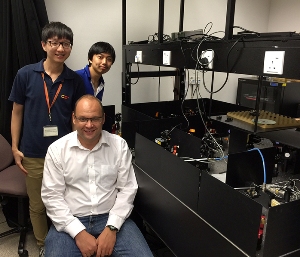Oct 30 2014
How many witnesses do you need to put particles on trial in a quantum court? Researchers at the Centre for Quantum Technologies (CQT) and the Data Storage Institute (DSI) in Singapore have demonstrated a technique that dramatically reduces the number. Their work is described in a 21 October paper in Physical Review Letters.
 CQT Students Jibo Dai (left) and Yink Loong Len (right) are pictured with the experiment they built for efficient detection of quantum entanglement. They worked with Leonid Krivitsky (centre) at Singapore's Data Storage Institute to put into practice a theoretical proposal from CQT PI Berge Englert and collaborators.
CQT Students Jibo Dai (left) and Yink Loong Len (right) are pictured with the experiment they built for efficient detection of quantum entanglement. They worked with Leonid Krivitsky (centre) at Singapore's Data Storage Institute to put into practice a theoretical proposal from CQT PI Berge Englert and collaborators.
The trial determines whether a pair of particles is entangled. Entangled particles exist in a shared state, their individual properties unfixed until one is measured. Entanglement gives an edge, for example, to the security of communication, and is essential in schemes such as quantum teleportation. Confirming its presence will be vital for technologies that attempt to harness the phenomenon.
Researchers have previously developed the idea of calling on 'entanglement witnesses' to determine whether entanglement is present between pairs of particles from a particular source. It's assumed the source produces an identical pair every time, and the witness is a measurement performed on each particle pair. If the value of the measurement, averaged over many pairs, crosses a predetermined threshold, it proves that those particles are entangled. If it doesn't, the result is inconclusive and another witness must be called.
For a simple system of two particles each having two possible states – qubits such as photons with polarisation aligned vertically or horizontally – it had been thought you'd need as many as 15 witnesses to determine without doubt if the particles were entangled. Each would test the state in a slightly different way.
Then, in 2010, CQT Principal Investigator Berge Englert and members of his group realised this approach was overkill. They came up with a scheme that would need at most six witnesses.
What Berge and his team noticed was that six witnesses, even if all are inconclusive, collectively give enough information to fully describe the particles' state. No further experimental data is needed to check for entanglement: you simply work out whether it's there from the state's description.
The same idea extends to particles more complicated than qubits. Applied to qutrits, for example, which have three possible states, the number of witnesses required drops from 80 to 11. When it comes to real experiments and devices, a more efficient scheme has obvious advantages: it's faster and easier to implement fewer measurements.
In the new paper, Berge and his collaborators report the realisation of the scheme. Berge struck up collaboration with Leonid Krivitsky at DSI, an institute of Singapore's Agency for Science, Technology and Research, and put two CQT students on the project.
The students Jibo Dai and Yink Loong Len, both now in CQT's PhD programme, spent two years building and running the experiment in Leonid's laboratory at DSI. They had no experience and they set everything up, starting from an empty optical table. It's quite an achievement," says Berge.
The team, involving Yong Siah Teo from the original proposal too, even managed to further improve the scheme. They showed that choosing the order of witnesses to maximise what is learnt about the state – they call this an adaptive scheme – brings down the average number of witnesses needed. For two qubits, they ran simulations and experiments showing the mean number of witnesses required per trial was about 2.5.